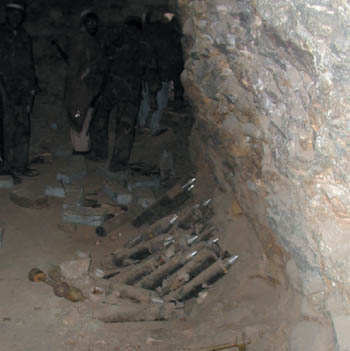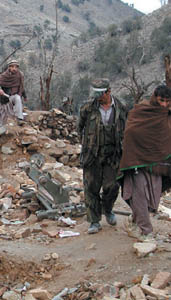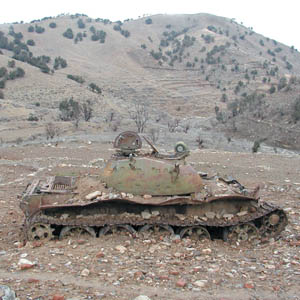![[Metroactive Features]](/features/gifs/feat468.gif)
[ Features Index | Silicon Valley | Metroactive Home | Archives ]

Photographs by Peter Bellone Guns and Poses: The author (fifth from left) with a local pro-American militia at Tora Bora. Drinking With Osama Every day, lately, we hear stories about the increasing travails of traveling internationally: the fingerprint scanning, the no-fly lists, the "shoes off." But Peter Bellone's travel misadventures may leave all the others in the waiting room. By Peter Bellone SOME PEOPLE think of the chicken and the egg or the meaning of life; I never do. I tend to think of the freaking and the jam and how do I get out of this freaking jam? And on March 8, 2002, I found my way into another one. Like most beginnings, it started out OK. I passed through security at the New Delhi airport without any problems. I didn't have enough energy left to feel nervous--I had missed my flight on the way there, and two days of napping in chairs had made me long for home and nothing else. At first, that nothing else included sleep as well. I should have gotten some on the flight, but fate had other plans: the friendly, willing-to-drink South Korean fellow sitting next to me struck up a conversation. One hour bled into another, and before we finished the sun rose over the sea. When the plane landed for a stopover in Seoul, en route to San Francisco, I was loopy enough to believe anything, like the one I heard from the Asiana employee. "Your bag OK. This way," as she waved her hand. "This way." That's exactly what I wanted to hear. The next flight to San Francisco was a day away, so I ate, found a row of chairs and went to sleep. One weird thing happened though: I opened my eyes, and two Koreans in three-piece suits were staring down at me. They said nothing, so neither did I, and I went back to sleep. Well rested, I prepared myself for a long night of pacing the airport. If luck had it, one of the cleaning crew might know a little English; there was no one else around, so round and round I went from one smoking lounge to another. About 10 laps later, five officers in black SWAT gear jogged shoulder to shoulder down the corridor. Right on, I thought. Where was my camera when I needed it? What I needed was a lawyer. "Would you come with us, please?" the man dressed like a pilot asked. I hardly heard him; the others had my attention. They stood with their backs toward us, evenly spaced, each man facing a different direction on a half-circle, a classic perimeter defense. As they escorted me to an office, I reasoned that this was some standard precaution, interviewing lone guys wandering the airport--nothing serious--but the suit in the lounge area wasn't smiling. "What religion are you?" he asked. "What did you pack in your bag?" "Toothbrush. Toothpaste. Sleeping bag. Socks. Underwear ..." I trailed off, but his silence urged me on. "Oh, you know, flashlight, batteries, a first-aid kit." Out of the corner of my eye, I saw another suit examining an 8-inch cardboard tube. "Oh yeah," I pointed. "I brought that too. It's a souvenir from Tora Bora." "Do you realize how serious this is?" Ten days ago, the situation seemed harmless enough. Shells from thousands of live anti-aircraft rounds were scattered about in the bunkers at Tora Bora, and the garrison commander didn't mind. He said take as many as you want, so I picked one up and stored it in a poster tube I had. He even let me shoot his AK-47. It was a great day. Apparently, as I slept, my backpack--along with its incriminating cardboard tube--had been making one lonely lap after another around the baggage carousel, until someone finally took pity and tried to reunite us over the PA system. When that failed, they X-rayed the bag. "You get off the plane at 10 in the morning. We don't find you until 11 at night. Why didn't you pick up your bag? Why were you running from us?" The Koreans wanted answers. These were answers the Americans wanted as well. Seungkyu Lee represented the FBI, and his bulky sidekick was from the U.S. embassy, and they took over the interrogation. "Well," I said. "I was asleep most of the time, and the short time I was awake, the Korean announcer probably butchered my name, and I didn't catch it." "You don't like Koreans, do you? That's why you don't tell me the truth," Lee held up his hand. "We're only here because this government respects the United States. It's their decision, so you better watch that." In a matter of 10 minutes, we went from PC to ugly, a logical evolution but unsettling all the same.
On the Road to New Delhi This had all really started, of course, with Sept. 11. Around 7am that day, my grandmother woke me up mumbling about destroyed buildings, thousands of deaths, we're going to war. I asked her if she had taken her medication, but she insisted, so I turned on the television just in time to see the second tower collapse. This has got to be a hoax, I thought--a group of high-tech lunatics paying tribute to Orson Welles and his War of the Worlds gag. It was on every channel, though, and confusion turned into shock, which became horror. After an hour I couldn't watch it anymore. I wandered around the empty streets of San Francisco for hours that afternoon without getting hit up for change--that's got to be a record--looking for a plane to hit the Transamerica building, looking for a mob, anything to curb this hollow feeling of wanting to do something. Distractions wouldn't cut it; I had to be involved. With the phone in my hand, I smiled at the weirdness of it all. Ten years ago nobody wanted out of the Marine Corps more than I. And now I was calling to re-enlist. The recruiter passed me on to someone who promised to look into it; my voicemails were never returned. I visited the reserve base in San Bruno. I called other military installations around the state. Finally I reached an officer who told me I was too old and had been out too long. "There's got to be something. ... There's got to be something," I said to myself in bed at night in between the repeating image of the plane striking the building. At the time, I had just finished writing a novel with religious overtones, and that got me thinking of St. Paul and how he went to strange lands and preached to hostile crowds. What a great way to test one's beliefs. He lost his life on the road in Rome. I figured the least I could do was head for Berkeley. The classroom for the antiwar meeting was packed: people sat on the floor, on the windowsills and others stood out in the hallway. One glance around, and I knew I was the sole spy among the choir. Like minds looked alike: lots of body piercing, superbaggy jeans, short hair on the head, long hair in the armpits. "Why don't we start this off with everyone introducing themselves," a woman at the head of the room said. I sat six people from her right, and the introductions were coming my way. "Hi, I'm Jessica from the Socialist Student's Union." "I'm Mike, and I manage the farmer's co-op." Two hundred people yelling at me wasn't my idea of a good time--I'm no Andy Kaufman. But I didn't feel like lying, and she asked. "Hi, my name is Pete Bellone, and I am totally in favor of going to war." Every face turned. You could hear the buzz of the tube lights, a silence as chilly as a Siberian winter. A different place, another era, that's probably where they would have sent me, too. "Uh, why don't we skip the introductions and start the meeting," she said. It only took about 20 minutes of discussing to get the group excited, and then an older man stood up and said, "No day of mourning for New York City until there is a day of mourning for all the victims of U.S. foreign policy!" People cheered. For a couple weeks, I despaired. The Left disgusted me, the businesslike tones of gunnery sergeants saddened me, and from all the reports I read the relief effort didn't need me. What was I going to do?
Beware the Subtext "You quit your job. You sell your car. You go to Afghanistan to be a freelance journalist, just like that. Out of the blue. This is Alice and Wonderland crap! How do you expect anyone to believe that?" Seungkyu Lee asked after hearing my story. The embassy man jumped in and the questions came rapid-fire. "Who are you protecting? Who put you up to this? Are you testing routes for terrorists? How did you get that thing on the plane?" From there, the fog of interrogation settled. "How can we help you if you don't help us ... You're looking at three to 10 years ... Why do that for someone who wouldn't do it for you? Trust us--you don't want to do time here. They have no problems with physical coercion ..." "I want to show you something," the embassy guy said, and I followed him into another room. In college, I enrolled in some literature classes where we discussed the significance of this, the subtext of that. To me, most of it seemed a stretch--exercises in job justification. Standing before my baggage now, contents unpacked and laid out in neat rows, I believed my professors were on to something. Most of the items on display were things I had acquired over the past three months, and each one had an innocent explanation. I wanted to get up early and be productive, so I bought a windup alarm clock. It was cheap; it worked. Maybe that's why the bad guys in the movies wired them to bundles of dynamite. Why get up early if you weren't going to talk to people? And nothing endeared people like trying to learn their language, hence the Teach Yourself Pashto book. And all the folks I met were Muslim, so I bought a Koran, another step toward understanding. That also explained why all the names in my address book were Muslim ones. Did they expect me to meet Buddhists? The posters and the political pamphlet--the one with Arabic writing heading a picture of the burning Twin Towers--these were items to show the family back home, and I thought they looked cool. And speaking of being away from home, I wasn't about to traverse dangerous lands without a good-luck charm--therefore I brought along a glass jar of Iwo Jima sand I got in the Marines. Unfortunately, at the end of my trip it slipped out and shattered, which explained the seven Ziplocked dime-sized baggies of black, volcanic sand. And of course, there was the cylinder, with its 30 mm live round. But hey, what could be cooler than that? After a pause, the embassy guy had only two things to say. "You got some weird shit in your bag. I'm leaving now. Is there anything else you would like to tell me?" Beware of the subtext and the alternate story our actions always tell, whether we choose to listen or not. This time I listened. "The press card is a fake," I admitted. "I couldn't get into Afghanistan without one, so my friend and I made one on his computer." The look on the embassy guy's face stayed with me the whole night, as I lay there in the airport detention center. I couldn't have slept anyway. They never killed the lights, and the floor was packed with men using their suit coats for blankets, mainly Chinese and Russians who'd been caught trying to sneak into the country. Instead of being locked up, it seemed like I had just missed a good party. Too bad the only thing being served now was a tall glass of regret. It was unbelievable. I had set off as a freelance journalist, and now I was in danger of being taken as another John Walker Lindh. At least he had the comfort of his conviction, a footnote in history. There was no glory for the jack-off. The next morning the same two Americans returned, bearing cigarettes and Kentucky Fried Chicken. But first there were questions to ask, lots of questions. Yesterday was a practice run. Today, they wanted to know everything: from the moment of arrival to now, hour to hour, day by day. The kind of details time normally swept away. "Where did you stay? ... What's the address? ... Who did you meet? ... What did you say? ... What's their full name? ... How do we get in touch with them?" What's their full name? How do we get in touch with them? I couldn't even answer these questions for half the women I've dated. That didn't matter to them. All unturned stones counted against me. "Your memory is very selective." And so on for hours.
To point out the ignorance of others after pulling a stunt so outrageously stupid might seem like some serious gall on my part, I know, but then again the security of the nation wasn't in my hands either. Before me sat two men representing two vital fronts in the war on terror, intelligence and diplomacy. Let's start with geography. They made me point out Islamabad, Peshawar, Karachi, Quetta and Kandahar on an improvised map, asking, "Is Jalalabad in Afghanistan?" Looking at possibly 10 years in prison, I figured, no problem gentlemen, I'm happy to give the geography lesson. Later on, I mentioned Gen. Musharraf's speech on Jan. 12, 2002, in which he banned foreign students in madrassas--religious schools that teach the Koran. That's relevant because only days before I tried to enroll in one in order to get a good story, and his announcement foiled all my attempts. Talk about a blessing in disguise! "Who is Musharraf?" Lee asked. Seriously. But still, I needed slack, I'll cut slack. Many names were dropped, and maybe it didn't register right away. Furthermore, in our country, the phone book is loaded with Carters, Fords and Clintons. Perhaps he thought the name Musharraf was popular in Pakistan. His follow-up question gave the game away. "Do you think your visit to the madrassa provoked his speech?" All flattery aside, these insiders didn't even have an outsider's grasp of things, the stuff you can read about in the papers. About seven hours later, when the talk took a turn for the circular, they stood up and motioned to the Koreans: "It's up to them. Good luck." I never saw the Americans again. At the downtown jail, it was the Koreans' turn to question me, and the difference in tone was radical. They asked questions along the lines of "Why did you jeopardize the lives of the passengers? ... How could you be so selfish?" Their concerns were for real people, not phantoms, or for sounding the alarm like the Americans. This compassion extended to me as well. Every step of the way the Korean police officers tried to reassure me. "I'm sorry, but I'm just doing my job. I know you are not a terrorist." Overall my experience was reasonable. The strip search consisted of a quick squat and a flash, no exploratory action. The food tasted better than half the restaurants I tried in Pakistan. One still slept on the floor, but this time the prisoners were issued a pillow and a blanket. Best of all, I was released the following day. No explanations were given, and I didn't ask. The San Francisco flight left the next day. I planned for another night of exercise, and again the police approached me and suggested I check into a hotel--with them in the next bed over. Who was I to argue? We went to the Olympus, a nice place with a foreigners-only casino. In the lobby, my jailers greeted me, and we shared a laugh among gentlemen. They even joked with me: "Tonight, we will get drunk with Osama bin Laden!" And get drunk we did. Three of us ended up at this karaoke/brothel. While the others competed for the affections of a lady, I stood behind the mike slurring my way through "Benny and the Jets." About that time, the two American interrogators popped into my mind, and their intimations of Korean police violence. Well, here I was having a great time, and I hadn't bought a drink all night, courtesy of their counterparts--their extremely nice counterparts. I wondered what they would have thought about that.
Peter Bellone is a freelance writer living in San Mateo and the author of the novel 'The Id Idiot.'
Send a letter to the editor about this story to letters@metronews.com. [ Silicon Valley | Metroactive Home | Archives ]
|
From the January 15-21, 2004 issue of Metro, Silicon Valley's Weekly Newspaper.
Copyright © Metro Publishing Inc. Metroactive is affiliated with the Boulevards Network.
For more information about the San Jose/Silicon Valley area, visit sanjose.com.


